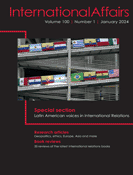
I am happy to announce that my co-authored article (with Emmy Eklundh and Thorsten Wojczewski) “Left populism and foreign policy: Bernie Sanders and Podemos” has been accepted for publication by International Affairs. The article is part of a special section on “The Effects of Global Populism” (ed. Daniel F. Wajner, Sandra Destradi and Michael Zürn) and will be available open access.
The article analyzes how populism is conceptualized and studied in International Relations (IR) and argues that it should be seen as a political logic instead of a political ideology. It does so by demonstrating that populist foreign policy looks radically different when analyzing the populist left, refuting the possibility of any distinctly ‘populist’ foreign policy positions. We argue that large parts of IR scholarship practice a form of concept-stretching that undermines the quality of analysis as well as the ability to make meaningful policy recommendations. Using the empirical case studies of Bernie Sanders in the United States and Podemos in Spain, the article demonstrates that populism does not translate into any shared ideological positions but is a way of formulating and performing – in these cases – leftist politics through which political actors can interpellate and mobilize different societal groups and demands behind their political projects. In particular, the analysis debunks common assumptions about populism’s alleged effects on foreign policy and dangers to pluralist democracy and shows that “populism” neither necessarily opposes multilateralism, migration and global public good provision nor formulates an authoritarian claim to power.
A pre-print is available here.